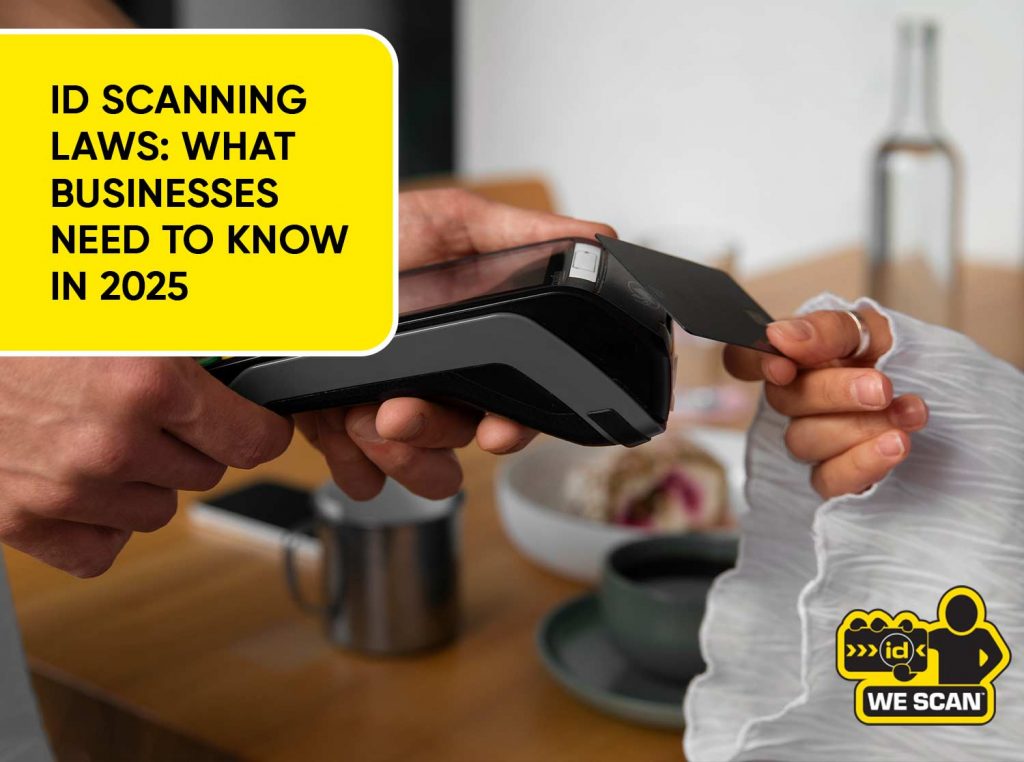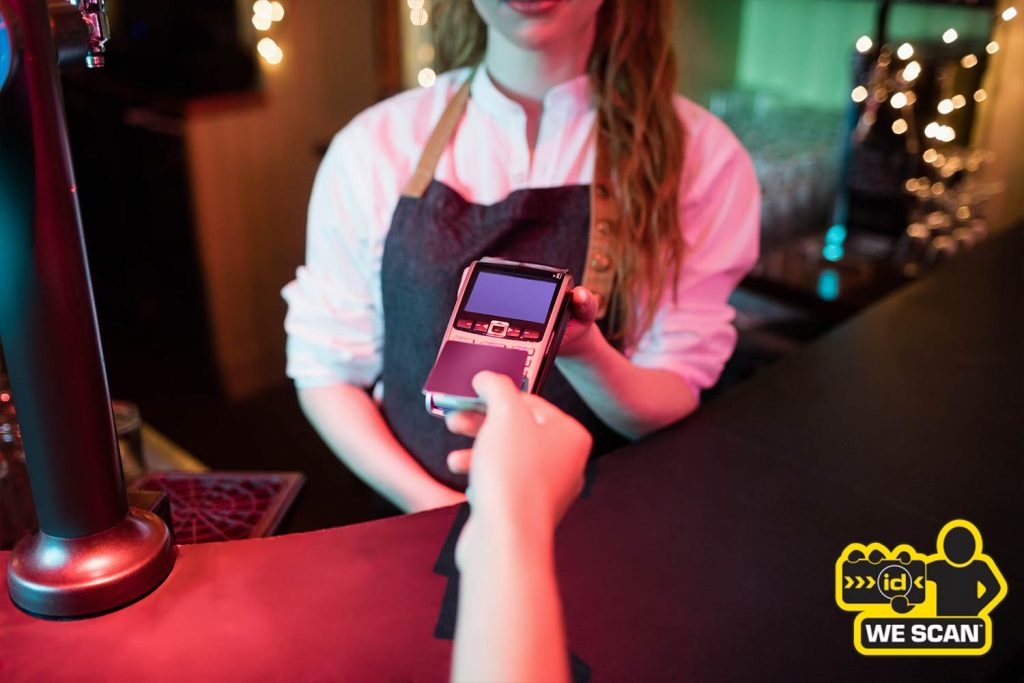ID Scanning Laws: What Businesses Need to Know in 2025
ID scanning is the electronic process of reading and extracting information from government-issued identification documents using specialized technology that captures data from barcodes, magnetic stripes, or RFID chips embedded in driver’s licenses, passports, and state ID cards. This technology has become increasingly common across American businesses, from bars and dispensaries to retail stores and gas stations, as companies seek to verify customer age, prevent fraud, and maintain compliance with industry regulations.
The legal landscape surrounding ID scanning varies dramatically by state, creating a complex web of permissions, restrictions, and obligations that businesses must navigate. While most states allow businesses to scan customer IDs for verification purposes, the rules governing what information can be collected, how long it can be stored, and whether customers can refuse scanning differ significantly across jurisdictions.

New Hampshire stands out as the only state that substantially restricts electronic ID scanning, while states like Texas, Nevada, and Utah have implemented specific requirements for certain industries.
Understanding these laws is crucial for business owners who want to stay compliant while protecting their customers and operations. From cannabis dispensaries that must track every transaction to alcohol retailers seeking legal protection against underage sales, businesses across multiple industries face varying degrees of regulation. The stakes are high—violations can result in fines, license revocation, criminal charges, and civil liability. At the same time, customers increasingly express concerns about privacy, data security, and their right to refuse scanning, making it essential for businesses to balance compliance needs with consumer protection.
What Are ID Scanning Laws?
ID scanning laws are regulations that define how businesses can scan, use, store, and share information from government-issued IDs. These laws balance two key goals: protecting consumer privacy and enabling businesses to verify age and identity.
At their core, these laws address several key questions:
- Can a business scan an ID?
- What information can be collected during the scan?
- How long can that information be stored?
- Can the data be shared with third parties?
- What security measures must be in place to protect it?
The primary purpose of ID scanning laws is to ensure businesses can prevent underage sales, reduce fraud, and comply with industry regulations without misusing personal information. For example, a bar may be allowed to scan a driver’s license to confirm age but may be prohibited from storing the customer’s address for marketing purposes.
Most ID scanning laws fall into three categories:
- Permissions: What businesses are allowed to do, such as verifying age at the point of sale.
- Restrictions: What businesses cannot do, such as using ID data for advertising or selling it to third parties.
- Obligations: What businesses must do to remain compliant, including securing data with encryption and deletingrecords after a set retention period.
The specific rules vary widely by jurisdiction and industry. Federal, state, and local laws may all apply, and different industries face different standards. For instance, a retailer in California must follow stricter privacy rules than a casino in Nevada, while a cannabis dispensary in Canada operates under its own set of national guidelines.
In short, ID scanning laws protect consumer privacy, regulate business compliance, and vary significantly by location and industry.
What Are the ID Scanning Laws by State?
ID scanning rules in the United States are primarily determined at the state level and vary by industry (e.g., alcohol, cannabis, gaming, tobacco) and use (e.g., verification-only versus data storage). Most states allow electronic scanning for age or identity verification, but they differ on what data can be collected, how it can be used, and whether it may be stored. A small number of states or sectors require electronic scanning, while one state substantially restricts it outside narrow exceptions.
| State | Notes |
|---|---|
| Alabama | Verification allowed; retention/use rules vary by context and industry. |
| Alaska | Standard verification permitted; check industry regulators. |
| Arizona | Permitted for age/identity verification; privacy obligations apply. |
| Arkansas | Verification allowed; industry rules can add limits. |
| California | Scanning permitted to verify age/authenticity; strict consumer privacy protections limit storage/use. |
| Colorado | Verification allowed; follow industry regulator guidance. |
| Connecticut | Scanning for verification permitted; retention/use subject to rules. |
| Delaware | Verification practices depend on industry regulations. |
| Florida | Scanning commonly used for verification; data use constrained by privacy provisions. |
| Georgia | Verify with state and local regulators. |
| Hawaii | Verification permitted; check industry rules. |
| Idaho | Verification allowed; storage/use subject to limits. |
| Illinois | Permitted for ID verification; consumer privacy considerations apply. |
| Indiana | Standard verification allowed. |
| Iowa | Verification allowed; check regulators for retention rules. |
| Kansas | Verification practices depend on industry. |
| Kentucky | Verification allowed; industry-specific rules may apply. |
| Louisiana | Verification allowed; storage/use often restricted. |
| Maine | Verification permitted; check local guidance. |
| Maryland | Scanning allowed for verification with limits on use/retention. |
| Massachusetts | Verification permitted; privacy protections limit retention/use. |
| Michigan | Verification allowed; follow industry regulator rules. |
| Minnesota | Verification allowed; retention/use may be regulated. |
| Mississippi | Verification allowed; check industry guidance. |
| Montana | Verification allowed; follow state/local rules. |
| Nebraska | Verification allowed; retention/use may be limited. |
| Nevada | For cannabis and gaming, verification and scanning of government-issued IDs are commonly required or standard practice under regulator rules. |
| New Hampshire | State law substantially restricts business electronic scanning and storage of driver’s license information unless authorized; visual checks are still allowed. |
| New Jersey | Verification allowed; check regulator guidance for retention. |
| New Mexico | Verification allowed; industry rules may apply. |
| New York | Scanning allowed for verification; data protection and retention rules apply. |
| North Carolina | Verification permitted; retain per regulator guidance. |
| North Dakota | Verification allowed; industry-specific restrictions possible. |
| Ohio | Verification allowed; check local rules for retention. |
| Oklahoma | Verification allowed; industry regulators may impose limits. |
| Oregon | Verification permitted; privacy/retention rules apply. |
| Pennsylvania | Verification allowed; retention/use rules vary. |
| Rhode Island | Verification allowed; check specific regulations. |
| South Carolina | Verification allowed; industry rules may govern retention. |
| South Dakota | Verification allowed; check regulators. |
| Tennessee | Verification allowed; industry-specific policies may apply. |
| Texas | New legislation requires electronic scanning of IDs to verify purchaser age for retail alcoholic beverage sales; implementation guidance is being issued. |
| Utah | Age verification rules require electronic verification or approved alternate processes for specified alcohol and online contexts; scanning is commonly used to comply. |
| Vermont | Verification allowed; follow industry/regulator guidance. Verification allowed; industry-specific policies may apply. |
| Virginia | Verification allowed; retention/use subject to rules. |
| Washington | Scanning allowed for verification; privacy and retention rules apply. |
| West Virginia | Verification allowed; industry rules may apply. |
| Wisconsin | Verification allowed; check regulators for retention requirements. |
| Wyoming | Verification permitted; industry-specific guidance may apply. |
| District of Columbia (DC) | Scanning used for verification; data use and retention are constrained by local privacy rules. |
What States Require ID Scanning?
The states that require or explicitly mandate electronic ID scanning in at least one industry or use case are:
- Utah: The state requires age verification for anyone who appears to be 35 years old or younger. Licensees may satisfy this requirement with an electronic age-verification device or an approved alternate process, and many bars and restaurants use electronic ID scanners to comply.
- Nevada: Nevada’s cannabis and gaming frameworks require strict age and identity verification. Cannabis retailers and certain cannabis consumption venues must verify that customers are 21 or older, and the Cannabis Compliance Board publishes compliance standards that make ID scanning the standard method.
- Texas: Texas enacted Senate Bill 650 (the Deshawn Jagwan Act), which requires the use of electronically readable information to verify a purchaser’s age in the retail sale of alcoholic beverages. The law sets a statutory mandate for electronic verification at retail checkout; implementing agency guidance and compliance timelines are being published.
Note: Many other states allow businesses to scan government-issued identification for age verification or authenticity checks but do not legally require electronic scanning. These states often impose limits on how scanned information can be used, stored, or shared under general privacy or industry regulations. Always check the specific statute and agency guidance for the state and industry where you operate.
What States Restrict ID Scanning?
Most U.S. states do not prohibit businesses from scanning government-issued identification for age verification or identity checks. However, some states place strict limits on scanning or storing the information captured from a scan. Below is a summary:
- New Hampshire: Generally prohibits businesses from electronically scanning, copying, or retaining machine-readable information on a driver’s license or nondriver identification card except in limited situations. These narrow exceptions include certain transactions with the license holder’s consent, uses required by law enforcement, or a few other specified business contexts. In practice, businesses in New Hampshire must rely on visual inspection or other non-electronic methods unless an exception applies.
- States with Restrictions: Several states allow scanning for verification but strictly limit how the captured data may be used or stored. Typical limits include allowing scanning only to verify age or authenticity, prohibiting retention of full license data for marketing, and requiring secure handling and prompt deletion of any retained information. Examples include California, Florida, Hawaii, and New York, where scanning is permitted for verification, but storage and downstream use are constrained by state rules or privacy laws.
Important Nuance: “Don’t scan” does not always mean “ban visual checks.”
- New Hampshire prohibits most electronic scanning and storage by businesses.
- Many other states permit visual ID checks but restrict electronic capture, retention, or use of scan data.
What Industries Must Follow ID Scanning Laws?

ID scanning laws do not apply equally to every business. They are most relevant to industries that sell age-restricted products, provide regulated services, or manage sensitive personal information. These industries must verify identity, prevent fraud, and comply with state and federal regulations.
- Alcohol and Tobacco Retailers: Bars, nightclubs, liquor stores, and tobacco shops are highly regulated. They must confirm that customers meet legal age requirements. In many states, electronic ID scanning is either required or strongly recommended to reduce the risk of underage sales and protect business licenses.
- Cannabis Dispensaries: In states where cannabis is legal, dispensaries must validate or scan customer IDs before completing a sale. Scanning ensures compliance with age restrictions and residency rules embedded in cannabis regulations.
- Gaming and Casinos: Casinos and gaming establishments must follow age verification laws and anti-money-laundering rules. ID scanning confirms that patrons are of legal age and provides a record of entries, exits, and transactions to satisfy gaming authorities.
- Healthcare and Pharmacies: Hospitals, clinics, and pharmacies rely on ID scanning to confirm patient identity, comply with HIPAA regulations, and prevent prescription fraud. In some states, pharmacies must scan IDs when dispensing controlled substances.
- Financial Institutions: Banks, credit unions, and lenders are subject to Know Your Customer and anti-money-laundering regulations. ID scanning helps meet these federal requirements while protecting against fraud and identity theft.
- Transportation and Travel: Airlines, car rental companies, and rideshare services often scan IDs to confirm identity before travel, vehicle rentals, or service access. In some cases, these businesses must keep records of scanned IDs for security purposes.
- Security-Sensitive Venues and Events: Sports arenas, concert venues, and large events may scan IDs to manage access, prevent underage drinking, and maintain In certain jurisdictions, scanning is required when alcohol is served, or age-restricted activities are offered.
What Are the Accepted ID Document Types?
ID scanning laws outline which forms of identification are valid for verifying a person’s age or identity. While exact rules vary by state, most jurisdictions recognize government-issued IDs that include a photo, date of birth, and security features to confirm authenticity.
Primary Government IDs: These documents are widely recognized and accepted for ID scanning:
- Driver’s Licenses:(including REAL ID-compliant versions): The most commonly used form of identification.
- State-Issued Identification Cards: Serve the same purpose as a driver’s license for non-drivers.
- S. Passports and Passport Cards: Accepted nationwide, with foreign passports also valid in most cases.
- Military Identification Cards: Used by active-duty, reserve, and retired service members.
Secondary Documents Some states and industries accept secondary forms of identification, depending on the context:
- Tribal Identification Cards: Recognized if issued by federally recognized tribes and include a photo and date of birth.
- Federal Employee Credentials: Used in certain regulated environments.
- Student Identification Cards: Accepted in limited cases, such as campus facilities or age verification in education-related contexts.
- Professional Licenses: Occasionally accepted where industry-specific regulations allow.
Special Cases
- Permanent Resident Cards (Green Cards): Accepted in some states but not universally recognized for alcohol or tobacco sales.
- Temporary or Paper IDs: Issued by DMVs, but many states restrict their use for age-restricted purchases.
Key Requirements
- The ID must be valid and not expired.
- It must be government-issued with security features that confirm authenticity.
- Most states require IDs to include a photo and date of birth.
- Certain industries, such as alcohol, cannabis, and gaming, may restrict acceptance to U.S.-issued IDs only.
Why Do Businesses Scan Your ID?
Businesses scan IDs for several reasons:
- Age Verification: Ensuring customers meet legal age requirements for restricted products and services.
- Fraud Prevention: Detecting fake or altered IDs that could enable underage sales or identity theft.
- Legal Protection: Creating documented proof of compliance with state and federal age verification laws.
- Enhanced Security: Identifying banned customers or individuals flagged by law enforcement.
- Data Collection: In some cases, gathering customer information for loyalty programs or marketing (where legally permitted).
Why Do Dispensaries Scan Your ID?
Cannabis dispensaries face strict state oversight and must comply with extensive reporting rules. ID scanning helps with:
- Compliance Requirements: Recording sales data to meet state cannabis tracking mandates.
- Age Verification: Confirming customers are 21 or older.
- Purchase Limits: Tracking transactions to prevent exceeding legal possession thresholds.
- Tax Reporting: Maintaining accurate sales records for state and local tax collection.
- Security Measures: Creating an audit trail to prevent illegal diversion and protect the business from penalties.
Why Do They Scan Your ID for Alcohol and Liquor?
Alcohol retailers use ID scanning to:
- Prevent Underage Sales: Electronic checks are more accurate than manual inspection.
- Avoid Legal Penalties: Protecting against fines, license suspension, or criminal liability.
- Detect Fake IDs: Advanced systems help discourage the use of counterfeit IDs.
- Create Legal Documentation: Establishing proof of due diligence.
- Reduce Liability: Minimizing risks from underage drinking incidents.
Why Do They Scan Your ID for Tobacco and Cigarettes?
Tobacco and vape retailers rely on ID scanning to:
- Comply with Federal Law: Meeting FDA rules requiring verification for anyone under 30.
- Meet State Mandates: For example, Nevada explicitly requires ID scanning for cigarette sales.
- Enhance Accuracy: Reducing human error in checking IDs.
- Regulatory Protection: Demonstrating good faith in preventing underage tobacco purchases.
- Operational Efficiency: Speeding up transactions while staying compliant.
Why Do They Scan Your ID at Clubs and Bars?

Nightlife venues scan IDs for both legal and safety purposes, including:
- Age Enforcement: Ensuring all patrons are of legal drinking age.
- Security Enhancement: Identifying banned individuals or those with active warrants.
- Capacity Management: Monitoring entry and exit to comply with fire codes.
- Incident Investigation: Maintaining records that can assist law enforcement if needed.
- VIP Services: Recognizing loyal patrons and offering personalized perks.
Can You Refuse to Have Your ID Scanned?
Whether you can refuse to have your ID scanned depends on state laws and business policies:
- General Rule: Most states allow businesses to set ID scanning requirements as a condition of service.
- Customer Options: You may refuse to have your ID scanned, but this usually means you won’t be able to complete the purchase.
- Business Discretion: Private businesses have the right to enforce ID scanning as part of their policies.
- State Variations: Some states require businesses to accept manual (non-scanned) ID checks, while others allow businesses to insist on scanning.
In short, you can say no, but the business can refuse to serve you.
Can You Refuse to Have Your ID Scanned in Florida?
Florida law permits businesses to scan customer IDs. Customers cannot demand a manual alternative if a business requires scanning. However:
- You may decline scanning, but you won’t be able to complete the purchase.
- Some businesses voluntarily allow manual ID verification instead of scanning.
- For certain transactions (like alcohol sales), ID verification is mandatory, and scanning helps businesses stay compliant.
Can You Refuse to Have Your ID Scanned in Ohio?
Ohio follows the general national trend:
- Businesses can adopt ID scanning as part of their policies.
- Customers may refuse, but service can be denied if you don’t comply.
- For age-restricted purchases (alcohol, tobacco, cannabis), some form of ID check is always required.
Note: Cannabis dispensaries in Ohio must scan IDs due to state regulations, so refusal in that setting is not an option.
Can You Refuse to Have Your ID Scanned in Michigan?
Michigan law permits businesses to require ID scanning. Your choices are:
- Accept the scanning requirement.
- Decline and not make the purchase.
- Find another retailer with different ID policies.
Why Do Some People Not Want Their ID Scanned?
While scanning is legal in most states, many customers have concerns, including:
- Privacy Protection: Worrying about personal data being stored or misused.
- Data Security: Fear of breaches that could expose sensitive information.
- Government or Corporate Tracking: Concern about records of personal activities and purchases.
- Identity Theft Risks: If businesses fail to secure databases, scanned IDs can be exploited.
- Commercial Use: Worry that data might be sold for marketing or unwanted solicitation.
- Profiling Concerns: Fear of being flagged or denied service based on past visit data.
Is It Legal for Stores to Scan Your Driver’s License?
Yes, scanning driver’s licenses is generally legal, but with limitations:
- Permitted Uses: Age verification, fraud prevention, and compliance with industry regulations (e.g., cannabis).
- Restricted Uses: Some states (e.g., Virginia) limit scanning to specific purposes, such as authenticity verification.
- Data Protection Requirements: Many states require businesses to secure scanned data and limit its use.
- Time Limitations: Some jurisdictions require deletion of scanned data after a certain period.
- Consent Requirements: A few states require explicit customer consent before scanning.
How to Check If Your ID Scans
To confirm whether your ID can be scanned:
- Barcode Inspection: Look for 2D barcodes on the back of your license, which store encoded information.
- Magnetic Stripe Check: Some IDs have a dark magnetic stripe on the back that can be swiped for data retrieval.
- RFID Detection: Many newer IDs contain embedded RFID chips that allow wireless scanning.
- Professional Verification: A DMV office can confirm if your ID’s technical features are working properly.
- Business Testing: You may ask a retailer to test-scan your ID, though some businesses may decline for policy reasons.
What Happens When Your ID Is Scanned?
When an ID is scanned, the system processes several steps in seconds:
- Data Extraction: Information is read from the barcode, magnetic stripe, or RFID chip.
- Information Display: Key details like name, date of birth, and expiration date appear on the screen.
- Age Calculation: The system automatically determines if you meet the legal age requirement.
- Document Verification: Advanced scanners check for tampering, counterfeiting, or mismatched details.
- Record Creation: Some businesses keep records for compliance, fraud prevention, or security monitoring.
What Happens When They Scan Your ID at a Gas Station?
Gas stations typically use ID scanners for:
- Age Verification: Confirming customers are of legal age to buy tobacco or other restricted products.
- Fraud Detection: Flagging stolen cards or suspicious transactions.
- Compliance Documentation: Recording purchases where required by law.
- Security Monitoring: Tracking individuals linked to past incidents.
The scan usually takes less than a second.
What Happens If Your ID Does Not Scan?
If your ID fails to scan, businesses may:
- Manual Verification: Visually inspect the ID and enter details manually.
- Alternative Documentation: Request another form of ID.
- Transaction Denial: Refuse service if scanning doesn’t work.
- Manager Override: A supervisor may approve the purchase after extra checks.
- System Troubleshooting: Attempt another scanner or restart the device.
Do Fake IDs Scan?
Whether a fake ID scans successfully depends on its quality:
- Sophisticated Counterfeits: High-quality fakes may include working barcodes or magnetic stripes.
- Basic Forgeries: Poorly made fakes usually fail during scanning.
- Database Verification: Some systems cross-check IDs against official databases, catching even advanced counterfeits.
- Security Features: Modern scanners detect holograms, microtext, and other hard-to-replicate details.
- Legal Risk: Even if a fake ID scans, using it is illegal and can carry serious consequences.
Do Expired IDs Scan?
Expired IDs often still scan, but acceptance depends on the business:
- Scanning Works: The barcode or magnetic stripe usually still functions.
- Expiration Notice: The system will often flag the ID as expired.
- Warning Alerts: Many scanners notify staff when expired credentials are used.
- Acceptance Limits: Most businesses won’t accept expired IDs for age-restricted purchases.
- Renewal Requirement: Certain transactions require a valid, current ID regardless of scanning capability.

